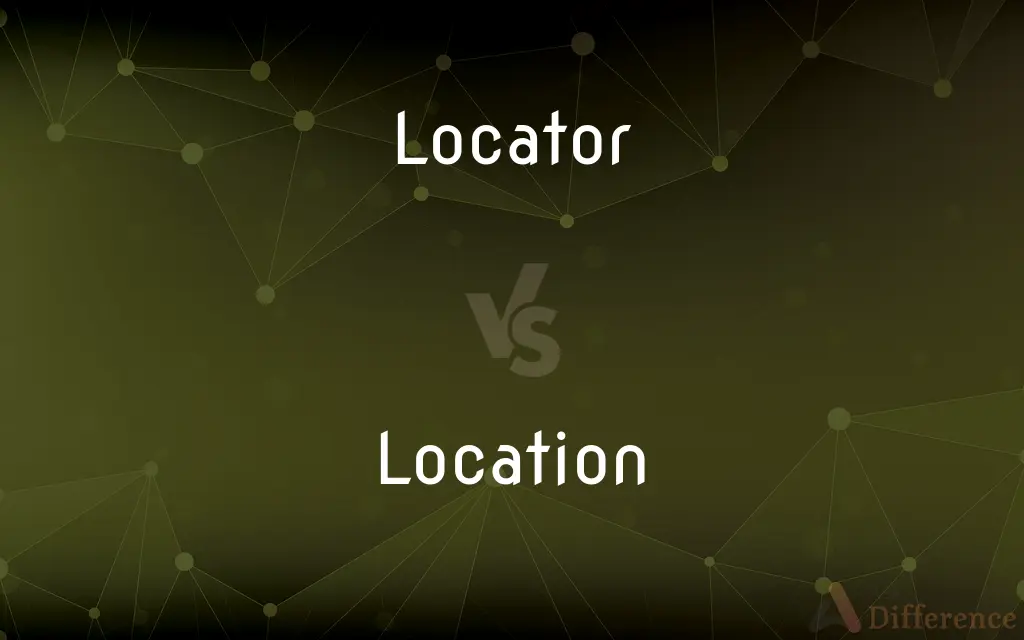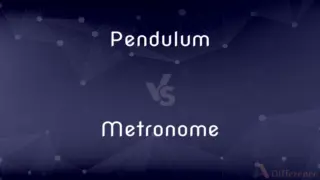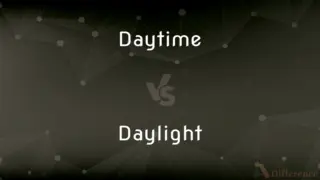Locator vs. Location — What's the Difference?
Edited by Tayyaba Rehman — By Urooj Arif — Updated on March 31, 2024
Locator refers to a tool or mechanism used to find a particular location, while location denotes a specific place or position.

Difference Between Locator and Location
Table of Contents
ADVERTISEMENT
Key Differences
A locator is often a digital or physical tool, such as a website, app, or device, designed to help individuals or entities find a specific place, object, or person. For example, a GPS device serves as a locator by providing directions to reach a desired destination. On the other hand, a location is the actual place or coordinates where something or someone is situated. It can be as broad as a city or as precise as a street address or set of geographical coordinates.
Locators are utilized across various applications, from navigation systems that guide users to a destination, to tracking devices that help locate lost items or individuals. In contrast, locations are static and can be described using various identifiers, including addresses, landmarks, latitude and longitude coordinates, or even relative descriptions based on well-known points of reference.
The effectiveness of a locator depends on the accuracy and detail of the information it has about locations. This includes up-to-date maps, databases, and communication capabilities. Meanwhile, the significance of a location can vary based on context, such as its cultural, historical, or personal importance, or its relevance to specific activities or events.
Both locators and locations are crucial in daily life, business operations, and various fields such as logistics, travel, and emergency services. While locators facilitate the discovery and navigation towards locations, understanding and identifying locations is essential for planning, development, and strategic purposes.
Comparison Chart
Definition
A tool or mechanism used to find a specific place
A specific place or position
ADVERTISEMENT
Examples
GPS devices, search engines, tracking apps
Addresses, geographical coordinates, landmarks
Purpose
To help find or navigate to locations
To identify where something is situated
Nature
Dynamic, depending on the accuracy of data
Static, defined by physical or geographical characteristics
Importance
Essential for navigation, tracking, and finding places
Essential for identification, planning, and context
Compare with Definitions
Locator
Serves as a navigation aid.
The GPS locator helped them find the remote cabin in the woods.
Location
Holds significance in planning and development.
The company chose a prime location for its new office.
Locator
Utilizes technology to provide real-time location data.
The app's locator feature can track your phone anywhere in the world.
Location
Describes a place's physical position.
The location of the ancient ruins is marked on the map.
Locator
Can be used to find objects, places, or people.
The pet locator collar helps owners find their pets if they get lost.
Location
Can be identified using various methods.
The hiker shared his location using GPS coordinates.
Locator
One that locates, as a smartphone app that shows the locations of nearby services or attractions.
Location
In geography, location or place are used to denote a region (point, line, or area) on Earth’s surface or elsewhere. The term location generally implies a higher degree of certainty than place, the latter often indicating an entity with an ambiguous boundary, relying more on human or social attributes of place identity and sense of place than on geometry.
Locator
One who, or that which, locates.
I found the opening times for my local branch using the Web site's store locator.
Location
A particular place or position
The property is set in a convenient location
Locator
(US) One who locates, or is entitled to locate, land or a mining claim.
Location
An area where black South Africans were obliged by apartheid laws to live, usually on the outskirts of a town or city. The term was later replaced by township.
Locator
(travel industry) The unique alphanumeric reference given to each travel booking.
Location
The act or process of locating
Location of the lost hikers took two days.
Locator
One who locates, or is entitled to locate, land or a mining claim.
Location
A place where something is or could be located; a site.
Locator
A person who fixes the boundaries of land claims
Location
A site away from a studio at which part or all of a movie is shot
Filming a Western on location in the Mexican desert.
Location
A tract of land that has been surveyed and marked off.
Location
A particular point or place in physical space.
Location
An act of locating.
Location
(South Africa) An apartheid-era urban area populated by non-white people; township.
Location
(legal) A leasing on rent.
Location
A contract for the use of a thing, or service of a person, for hire.
Location
The marking out of the boundaries, or identifying the place or site of, a piece of land, according to the description given in an entry, plan, map, etc
Location
(Kenya) An administrative region in Kenya, below counties and subcounties, and further divided into sublocations.
Location
The act or process of locating.
Location
Situation; place; locality.
Location
That which is located; a tract of land designated in place.
Location
A leasing on rent.
Location
A point or extent in space
Location
The act of putting something in a certain place or location
Location
A determination of the location of something;
He got a good fix on the target
Common Curiosities
Why are locators important?
Locators are important for navigation, tracking valuable items, or finding places and people efficiently.
What makes a location important?
A location's importance can be determined by its cultural, historical, economic, or strategic significance.
What is a locator?
A locator is a tool or application designed to help find a specific place, person, or item.
How does a locator work?
A locator works by using data, such as GPS signals, maps, or databases, to guide users to a specified location.
Can a location change over time?
While the physical or geographical characteristics of a location remain static, its contextual significance or use can change over time.
What does location mean?
Location refers to a specific place or the position of something or someone.
Do locators only use GPS technology?
While many locators use GPS technology, others may use different technologies or data sources, such as Wi-Fi positioning or RFID.
How has technology improved locators?
Technology has significantly improved locators by increasing their accuracy, speed, and ease of use through advancements in GPS, data analysis, and mobile connectivity.
How do I choose the best locator for my needs?
Choosing the best locator depends on your specific needs, such as the type of object or person you're trying to find, the required accuracy, and the environments in which it will be used.
How can I share my location with someone?
You can share your location using smartphone apps that utilize GPS technology, through social media platforms, or by providing physical addresses or coordinates.
What role do locators play in emergency services?
In emergency services, locators are vital for quickly finding individuals in distress or navigating to urgent situations efficiently.
Are all locators digital?
Most modern locators are digital, but traditional methods, like maps or compasses, can also serve as locators in broader terms.
Can a locator find anything worldwide?
The ability of a locator to find something worldwide depends on its technology and the availability of global positioning data.
What information is needed to find a location?
To find a location, information such as addresses, landmarks, or GPS coordinates is needed, depending on the context and available tools.
Is understanding a location's context important?
Yes, understanding the context of a location can be crucial for reasons such as cultural sensitivity, strategic planning, or historical significance.
Share Your Discovery

Previous Comparison
Pendulum vs. Metronome
Next Comparison
Daytime vs. DaylightAuthor Spotlight
Written by
Urooj ArifUrooj is a skilled content writer at Ask Difference, known for her exceptional ability to simplify complex topics into engaging and informative content. With a passion for research and a flair for clear, concise writing, she consistently delivers articles that resonate with our diverse audience.
Edited by
Tayyaba RehmanTayyaba Rehman is a distinguished writer, currently serving as a primary contributor to askdifference.com. As a researcher in semantics and etymology, Tayyaba's passion for the complexity of languages and their distinctions has found a perfect home on the platform. Tayyaba delves into the intricacies of language, distinguishing between commonly confused words and phrases, thereby providing clarity for readers worldwide.














































